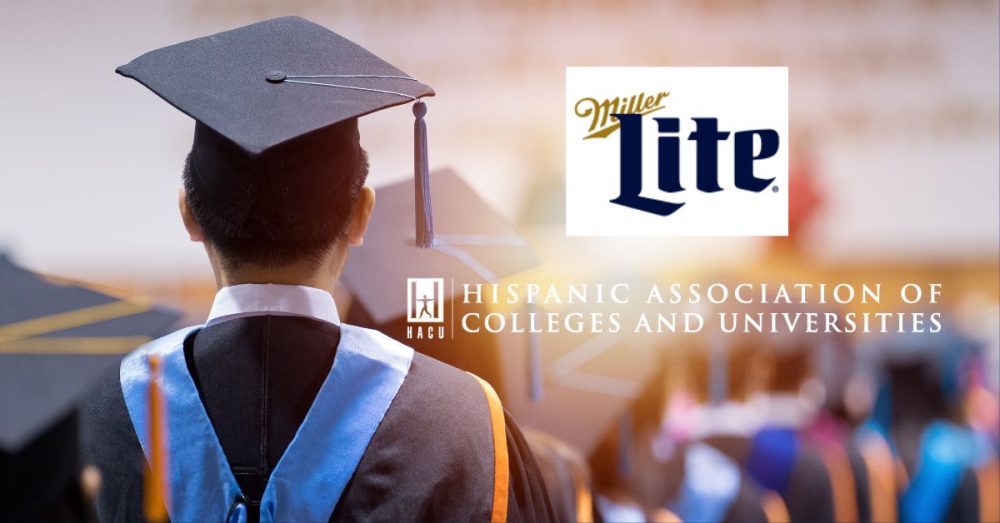The partnership between Miller Lite and the Hispanic Association of Colleges and Universities persists in furthering an almost two-decade collaboration to offer scholarships and cultivate the future cohort of Hispanic leaders. However, the scholarship criteria may provide contradictory information.
Miller Lite’s Brewed to Be Bright scholarship program seeks to improve educational resources, cultivate leadership skills and open up career prospects for students enrolled in Hispanic Association of Colleges and Universities (HACU)-member schools, according to a press release. The program awards $5,000 scholarships totaling $115,000, specifically focusing on Hispanic college students in California, Colorado, Florida, Illinois, New York, Texas, Wisconsin, and Puerto Rico.
“Hispanic students in the U.S. and Puerto Rico can apply for the chance to be awarded $5000 and access to HACU’s ¡Adelante! Leadership Institute,” the joint press release states. The announcement concludes with a link to the HACU website for more information.
However, when following the link, the qualifications for the scholarship do not mention race as a requirement.
The “Current College or University Students” criteria is as follows:
- Are currently enrolled at a HACU-member institution;
- Have graduated from a high school or have earned a high school equivalency diploma in the U.S., Puerto Rico, or outside of the U.S.;
- Have completed your first semester of college at a HACU-member institution;
- Intend to enroll at a HACU-member institution in the Fall 2024 semester/term of the 2024-2025 academic year.
- If you are transferring institutions, the institution must also be HACU-member to be eligible to apply; for the most up-to-date listing of HACU-member institutions, Please Click Here.
- Demonstrate financial need if required by the scholarship sponsor, typically determined by the FAFSA application or State/Institutional Aid application (non-citizen students who are not eligible to complete the FAFSA).
While there is no mention of race in the HACU website’s college requirements, there is a new mention of legal status.
The Miller-HACU statement says the program is only open to those legally in the United States. However, the HACU website includes an additional “Other (please specify)” category of legal status. It is unclear what other status this could refer to.
Miller Light Brewed to Be Bright Scholarship is one of several endowments that support education through HACU. Other partners include Deloitte, Google, and The Coca-Cola Foundation.
Molson Coors (Miller’s parent company) and HACU were contacted by The Dallas Express to explain why the scholarship information varied in race and legal status. While HACU did not respond, a representative for Molson Coors did.
While the press release only explicitly invited Hispanic students to apply, the representative said all could apply.
“While the application is not limited to Hispanic students only, HACU (Hispanic Association of Colleges and Universities) supports Hispanic students through their work and by awarding these applications to students at HACU-member Hispanic-Serving Institutions,” she said before pointing The Dallas Express to a list of previous years’ recipients.
DX looked into previous winners’ last names or LinkedIn photos, noting each suggested some Hispanic ancestry, except for one whose ethnicity could not be determined by either metric.
On the subject of immigration status, the Molson Coors representative prefaced her response by discussing HACU broadly.
“HACU encourages all students to apply for partner scholarships, regardless of immigration status,” she said. “This includes international students and undocumented students, including those with DACA or TPS.”
Then, she turned her attention to the Miller scholarship:
“This specific scholarship is awarded to students who are studying at HACU-member Hispanic-Serving Institutions. Hispanic-Serving Institutions (HSIs) are defined in Title V of the Higher Education Act as not-for-profit institutions of higher learning with a full-time equivalent (FTE) undergraduate student enrollment that is at least 25 percent Hispanic.”
The scholarship announcement’s seemingly racial nature follows a reconsideration of the role race should play in helping students get to college. In the summer of 2023, the Supreme Court struck down race-based affirmative action programs in college admissions.
While the text of the high court’s opinion was tailored only to admissions decisions and not scholarships, some state attorneys general, like Andrew Bailey in Missouri, have issued orders telling universities in their jurisdiction to halt race-based scholarships.
Texas passed a law known as SB 17, which seeks to halt “diversity, equity, and inclusion” programs at public universities in the Lone Star State. After the law took effect at the beginning of 2024, 131 scholarships that excluded certain racial groups or were intended to benefit certain groups over others were frozen or amended, as reported by Inside Higher Ed.
While it is unclear if this law applies to the Miller scholarship, as it is privately funded and could be used at private universities, its somewhat jumbled composition reflects the greater scramble around race and scholarships.
Compliance with SB 17 has been spotty. A previous DX investigation identified six Texas universities, including the state’s flagship, as possibly violating the DEI ban.


